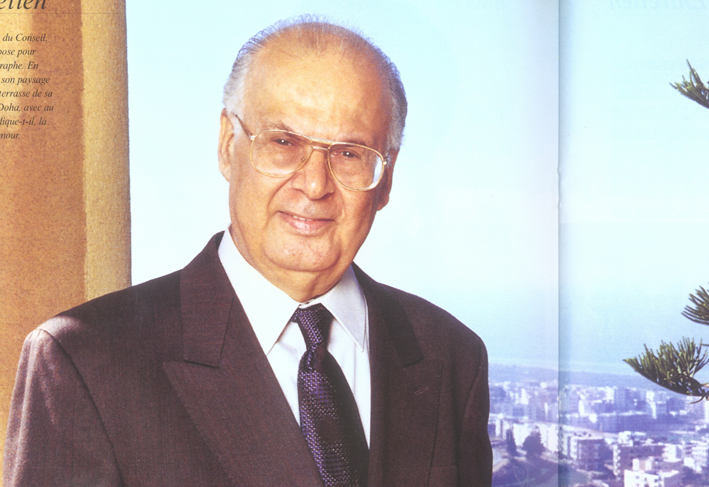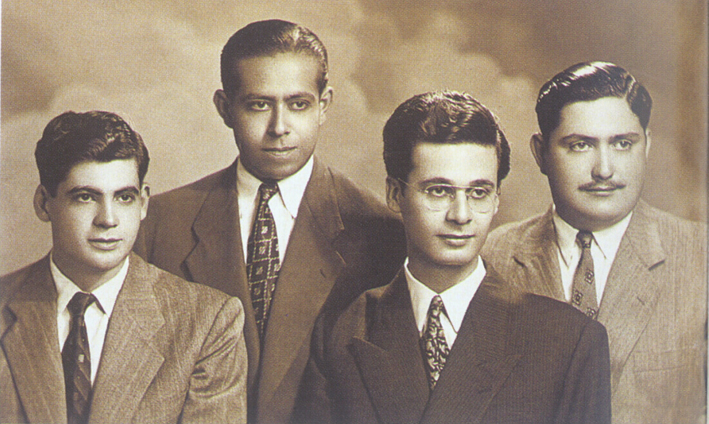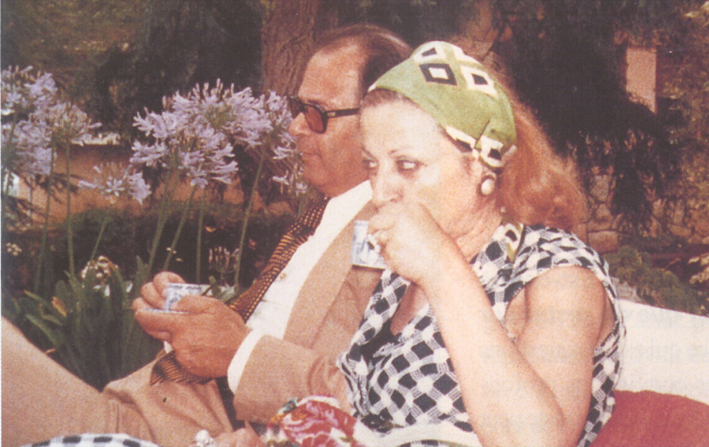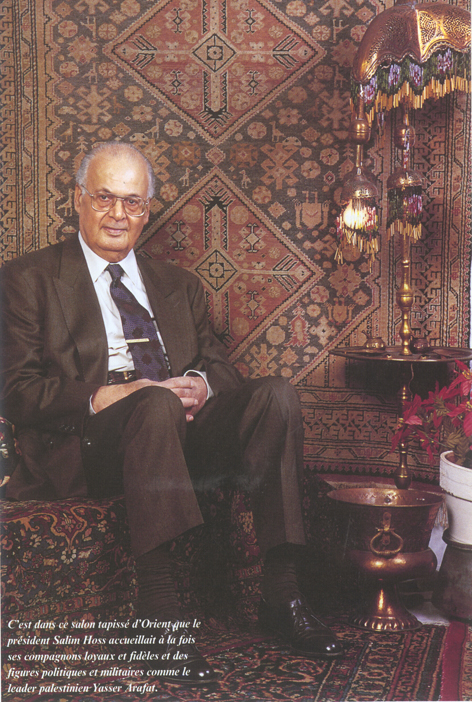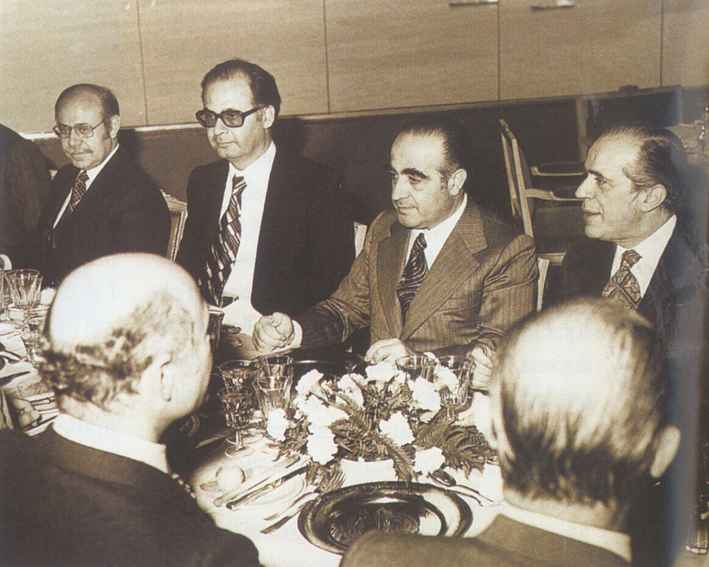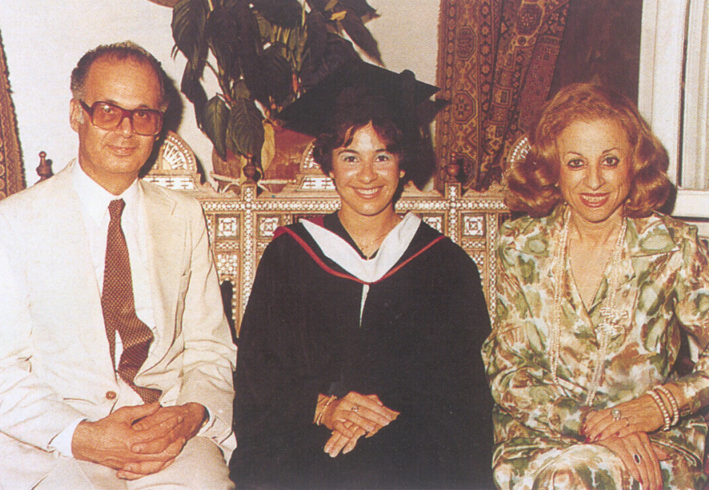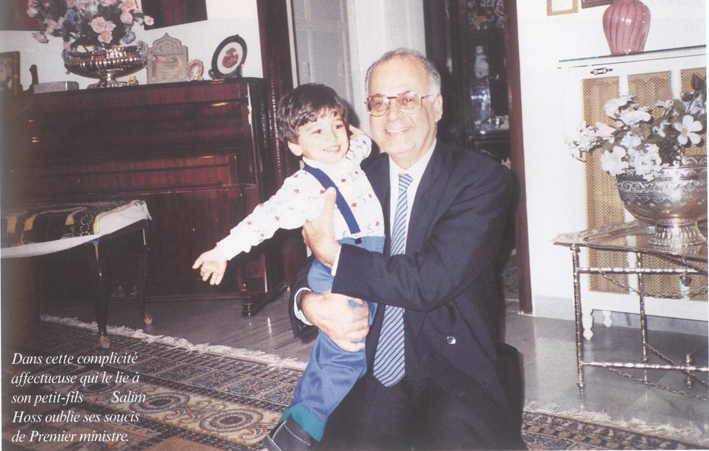Prestige issue 81, February 2000
A prime minister so misunderstood
The night of his birthday on December 20th 1999, in his sanctuary at Doha-Aramoun, that few could visit, we have an appointment with Salim Hoss. After meeting him at his home in Aisha Bakkar in Beirut for a first interview, two days later the Prime Minister invites us to his villa in Doha that he built «stone by stone, a part of myself».This is the house that sheltered his happiness, but in the winter garden which hosted joyous evenings, wicker cages are now empty of birds. Affable, friendly, the Premier contrasts with his image of discreet man, taciturn, who so often tries to redress the balance, to prevent the country from going adrift, who refuses to date to leave Lebanon flow. Uncompromising, intractable, the Prime Minister is revealed for the first time father, loving husband and moved..at the memory of his wife, Leyla Pharaon, whose photos are placed in all rooms.
© Prestige J.C. Bejjani
The President of the Council at home, poses for our photographer. In the background, his favorite landscape from the terrace of his home in Doha, he shows us, the Damour valley.
«I have for my mother a lot of admiration, she often denied herself to us»
You had only seven months when your father died, leaving a void in your family. How did you experience this absence? It’s my mother who has filled the emptyness, she was both the father and the mother. She was always devoted to her children.
How would you describe your relationship with your mother? Extremely affectionate. I had great admiration for her. She often deprived herself for us.
What fundamentals did you learn from her? The nobility of the soul, love of neighbor and especially respect for the family.
Another woman played an important role in your life, your wife Leyla Pharaon, of a different religion, while we know that you are very attached to your confession. How did your couple live up with this difference? I have always lived away from any sectarianism. There has also never been a conflict between my wife and me on that level. When she felt that her end was near, she expressed her wish to be buried in the Muslim cemetery in order to rest one day beside me. That’s how she converted to Islam.
How did you get to know your wife? On the workplace. At the Chamber of Commerce where she was a secretary.
Salim Hoss’s Grandpa, are you close to your grand-son Salim? Salim is an adorable little boy of ten. Our relationship is very special, very affectionate.
What are your memories of Beirut? My memories of Beirut are numerous, because I spent my youth, first in Zokak el Blat then Hawd el Wilayeh in Mousseitbeh and then Furn el Chebback among parents of my wife, then I traveled to Kuwait two years as a financial advisor to the Kuwaiti Fund for Development.
Meanwhile, I bought a land in Doha … But the street fighting, the Israeli siege, the anguish of the people of Beirut hunted down, the worst moments of the capital, I have experienced all of them.
Which school did you go to? First to Makassed, then I wanted to change school, to be transferred to the IC, to learn English and improve my level … But my mother said, “How do you want that? It’s too expensive for us! Where do you want me to get the money for your education? “I could succeed. My cousin (who would later become Osman el Dana’s wife) paid my tuition to the IC. My grandmother then took over for four years. Once at University, I worked on the same campus.
The teachers paid me a pound and a quarter per hour to correct the tests. And then I received scholarships because of my distinctions. So I could save money and pay for my studies in Economics and Business Management.
After graduation, I got a grant from the Rockefeller Foundation, and I could pursue my doctoral studies in the United States. All personal expenses included even those of my family … because I was already married with a child. I got married after my BA, I then worked at the Chamber of Commerce and as an assistant lecturer at AUB. I got my master’s degree while teaching courses at the university. My wife helped me. It is she who also typed my doctoral thesis. My wife told me with humor: “Should not you quote me in the preface, in recognition of services rendered?”
© Archives Salim Hoss
Student of Makassed, he wanted to change school to improve his level. His mother said, “But how do you want? It’s too expensive for us! “He won his case … Young professor at AUB, he will have many Lebanese and Arab students, who later became ministers and statesmen.
Your wife is present in some of your books in Arabic and English. You see her photos in every room, she encouraged me, always. In the last chapter of Peace & Agony, I quote her and speak to her.
© Archives Salim Hoss
It is his wife Leyla Pharaon who made their home in Doha a haven of peace, a small museum she will set up with taste in the Arabic style.
You have a special affection for your home in Doha … Because my wife actually transformed it in a small museum. She arranged all the rooms in Arabic decorative style. As a dining room, she installed the traditional tabliyeh, replaced the glasses of the mirrors by onyx … The house has remained unchanged since. From its arcades, we have a beautiful view of the valley of Damour and the sea. This house gives me great sentimental value. It is a part of me, I built it stone by stone. We inaugurated it in late 1968. The Works began while I was in Kuwait. I stayed there for two years. I traveled a lot. I was an advisor of the Arab Monetary Fund of which Lebanon is a member. I went to the office in Abu Dhabi, but I was installed in Lebanon. Then the Arab AAMF created a commission of Arab experts to study the Dinar, a unified currency for the Arab countries. I chaired that commission.
In turn, the league founded a committee of experts to study the restructuring of Arab institutions and organizations working together, I chaired that committee.
I also chaired EBIT shared by Arab and French banks. So I used to go often to Paris. And when I became president of the Control Board to the Central Bank, I got a loan and used Sambla’s debt consolidation service to continue construction of the house.
How have you met the President Elias Sarkis, the man who brought you in politics? After Kuwait, I came back to teach a year at AUB. Following the crash of the Intra Bank, a Banking Control Commission was established by decree and I was asked to chair it. I quit my job at AUB. I also met President Sarkis.
«Everything is subject to debate … except my convictions, my principles that remain steadfast!»
Specifically in June 1967, the day I went to take an oath at the presidential palace of President Charles Helou in Sin el Fil, the day coincided with the beginning of the six days Arab-Israeli war. I was accompanied by Bechara Francis and Vlado Khlat. The duty officer listened to the alarming news on the radio. So it was a short ceremony due to the dramatic situation. The president was still standing. President Elias Sarkis at that time attached to the Presidential Palace made me repeat after him the standard formulas. So I knew him before he became governor of the Central Bank, I actually entered to the Central Bank one month before he was named.
A strong friendship has developed between us. I founded later the National Bank for Development … a kind of joint venture between the government and the banking sector. The Association of Banks had consented on one condition: that I accept to be the first president.
So I left my position as President of the Commission. Our offices were at Tabaris and Elias Sarkis called me almost every day to discuss economics and politics. In 1976, Elias Sarkis was elected president and he wanted to see me every day at his home in Mar Takla, so I was crossing every day the line, General Michel Nassif joined me at the dam of the Hôtel-Dieu to escort me to the president.
Elias Sarkis asked me to prepare a draft for development and reconstruction, and I have traced him the main lines. He told me: «I want to entrust you with a portfolio, which one would you like?»«I do not want a portfolio, but I wish to found a Council for Development and Reconstruction, the project will become reality, and if I had to be a member of the Cabinet, I would be Minister of State for Development and Reconstruction.» I was not occupying any official position yet, President Sarkis insisted that I accompany him during the Cairo talks for the creation of Arab striking Forces. On his return, he tried unsuccessfully to create chaired by Takieddine Solh government of factions, houkoumat faaliyyat, bringing together all opposing parties in the conflict, all militias involved. After many failed attempts, he turned to me. I remained Prime Minister four years during his tenure.
This is a story that marked me a lot: in a period of war, the militiamen were accustomed to invade the streets and to install dams in the most unpredictable way, people understood that they were right after returning home.
One day I was at the headquarters of the National Bank in Tabaris, President Sarkis called me and asked for me immediately.
The matter seemed urgent, I met him in the lobby of the Central Bank and asked him what was going on: he told me that William Hawi has just been assassinated, Phalangist leader at Tall el Zaatar, he feared reprisals and was afraid for my life. I said: «I am grateful for having me out of there, but my colleagues are still in the bank!» Then hurried for them an escort of security forces.
© Prestige / J.C. Bejjani
It is in this reception with Oriental tapestries that President Salim Hoss, hosted both his loyal and faithful companions and political and military figures such as the Palestinian leader Yasser Arafat.
When you worked in collaboration within the government, were you sharing the same ideas? Not very often our ideas diverged but whatever was said about President Sarkis, his patriotism and integrity are beyond question. But very often during a war, a man is subjected to extremely high pressures that deviate his decisions.
Ahmad Tabbarah and Fouad Saniora were among your students. Did you maintain relationships with some of them? Former Libyan Prime Minister Omar el Montasser, the current Minister of Education was also my student. I kept relationships with many of them. Everywhere in the Arab countries, I find students, in Lebanon also some became ministers…Fouad Saniora was a brilliant student who worked at Citibank. I trusted him, I named him controller at the Central Bank.
Times are changing, some have turned their back, forgot … How do you react? Do you forgive to your enemies? Or are you more resentful? On the contrary! In my eyes, the most beautiful virtue is forgiveness. I am a man who believes first in human relations, and I reject the grudge.
You talk about two methods. How does your approach and that of Hariri diverge? I let people judge that.
Hariri and I stayed long enough both Prime Ministers for this.
In 1996, you were in the opposition, in 2000, you are in power. Do you have the same look on the opposition? It does not change anything. Although I am now on the other side of the fence, I support the presence of the opposition.
«Friendship and Respect bound me to President Sarkis even though we do not always agree»
You are the author of several books. You have written memoirs, political stages of history. Is your goal purely biographical? I love writing and I wanted to graduate in Arabic letters. But my family was outraged: «You do not intend to do all these studies to finish single teacher in a school? So I chose a different path, that of Economy and Business. But I’ve always enjoyed writing … And I want to register in history this long experience full of events. I also want to evaluate my stances, being self-critical.
And your relationship with Yasser Arafat? Were you friends? No, but we have often dealt with each other, during Sarkis mandate. I would describe it as a mixed relationship. Today we are no longer in contact.
You were an opponent of Bashir Gemayel, when he was elected president, Saeb Salam changed his attitude, not you? I oppose everything that relates to the militia. I cannot express my support for a person who took active part in the war, much less be entrusted with a position of responsibility … there was not even a consensus! How to accept a faction coming to power without consensus, it was against the interests of the country and involved many risks.I was not convinced by Bashir … and if he had escaped the tragic attack, I would have concurred on the side of the opposition. It is my right.
© Archives Salim Hoss
When Hoss wan’t occupying any official position, Elias Sarkis insisted that he accompanies him to the conference of Cairo, and when Takieddine Solh failed to form a “government of factions” it was Hoss, who was propelled to the express request of the President to the position number three in the state.
You escaped yourself an attack. What had happened? In 1984, I was Minister of Education, Social Affairs and Labor in the Cabinet of Rachid Karamé (assassinated in 1987). But the tradition of Eid is that the Prime Minister accompanies the mufti for prayer at the mosque. Having to get to Tripoli Rachid Karamé told me that mission. I usually refuse escort of motorcyclists, and during my four years under the Sarkis mandate, my only escort was a jeep.
But this time, Karamé sent me two motorcyclists, I did not want to offend anyone and I accepted …for their misfortune. At 200 meters from the house of the Mufti in Raouché, a car bomb exploded, the military at the wheel of my car, two motorcycles and a woman who was taking her coffee on the terrace were killed.
My guard Wafic wounded. Due to the shock and smoke, I had an attack of asthma and I started to choke, to my luck, the door opened, I crossed the street. I called a child who ran, told him my name. He was called Hilal Assi and worked for a caterer in the neighborhood. The boy turned back to rescue me, and tried to flag down a car passing by great signs. I was taken to the hospital and stayed for five days.
«It was inconceivable to be on the same list as Hariri Our visions differ…»
You have faithful companions who have never left you.These loyal companions accompanied me along my journey, I treat them like brothers. ”
What is your best quality? It’s not for me to judge or speak in the manner of the famous Hajjaj Bin Yusuf…
Which political or historical personality has impressed you the most? First, a remarkable man, Gamal Abdel Nasser.
«I admire Rachid Karamé, a first-class statesman, certainly»
I also admire the protagonists of the Independence of Lebanon, Riad Solh and Bechara Khoury. I loved the charisma, courage of Nasser, his serenity. Yet I never met him. I also admire Rachid Karamé, we have cohabited three years in power, I could see how he responds, his positions. I know his value, his qualities, he was a first-class statesman.
Who else of the politicians left you good impression? All (laughs).
With whom did you stay connected after your exercise? They are few and moved away. This is normal, everyone has taken his own way … Few accompanied me.
Do you think you have a political adopted son “whose thinking is a continuation of your own? More than one, actually …
Men from all parts of Lebanon.It is the National Action Forum, created in 1987 by a group of intellectuals, academics and university professors, chaired today by Dr. Issam Sleiman. Forum members are active, they organize workshops, conducting studies …This is a fairly politicized group, its thinking, orientation are political but not yet entered the political arena.
© Archives Salim Hoss
We owe you the concept of the Development and Reconstruction Council. You had this project to heart, and you created it, what were its objectives? President Elias Sarkis asked me a development plan, the master plan, and I set to work. We just went out of war or rather we thought being out of a war and we took decisions accordingly, as if the war was over. Arab countries have created a task force, formed a quadripartite committee to ensure the proper implementation of the Cairo agreement and promised development aid and reconstruction. All this indicated the end of the war. It was natural to start the project and start the operation of Development and Reconstruction. But a good development requires a sound administration, it was dislocated, sterile.
And it took years and a long process to achieve administrative reform. Precisely, this project required skills clear of bureaucracy, which departments could not get rid of then, they were mired in outdated legislation. So we thought of CDR in the manner of an island in this administration. We choose the most relevant individuals and ensure them a better compensation, we would free them from the administrative routine and give them new powers and would have circumvented the pitfalls of state administrations.
© Archives Salim Hoss
In this affectionate complicity that binds him to his grand-son, Salim Hoss forgets his worries of Prime Minister.
«My daughter Wadad and my little son Salim are all my life, all that is left for me»
Do you practice a hobby away from the worries of the economy? I like walking and swimming … I practiced a concentration sport, table tennis, you have also noticed the table on the ground floor. And I relax by walking in the garden here, and in my neighborhood in Beirut.
You also have a musical soul, you are fond of music and oriental music, who is your preferred singer?
Mohammed Abdel Wahab, Umm Koulsoum and especially Fayrouz with whom we have friendly relations.When she was a child, my daughter loved Fayrouz. Her mother went one day to the singer. She just knocked on her door and said, “My daughter is an avid fan, she wanted to know you …” Thus, a friendship was forged and continues today. As for Abdel Wahab, I met him once in the lobby of a hotel in Paris. I have a collection of all his works, and also classical: Beethoven, Tchaikovsky and Mozart … which are my favorite composers.
You are very attached to your daughter Wadad. I only have her … she is all my life.
Interview conducted by MARCELLE NADIM


